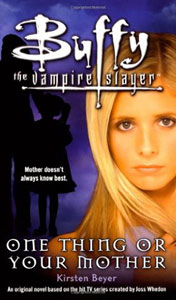Ironically, the “Buffy” book line ends its 1997-2008 run with a couple of firsts: “One Thing or Your Mother” (March 2008) is the debut entry from Kirsten Beyer, and the first novel set during the Angelus arc of Season 2. That’s surprising at first blush, but in retrospect it’s understandable why tie-in writers had stayed away from this period that’s so perfectly chronicled by the TV show (along with one comic tie-in, “Ring of Fire,” although even that is by a TV writer, Doug Petrie).
Despite the high expectations she sets up by positioning a story between “I Only Have Eyes for You” (2.19) and “Becoming, Part 1” (2.21), Beyer pens a remarkably good yarn that arguably would’ve made a better episode than the oft-lamented “Go Fish” (2.20). The idea that everyone is falling into slumbers they won’t awaken from unless Buffy solves the puzzle was also used in “Afterimage,” but “One Thing or Your Mother” especially drives home Buffy’s fear of potentially losing everyone she loves, even as she’s coming to terms with losing Angel, and her challenge of solving this case without the help of Willow, Xander and Giles.
The later chapters find Buffy going solo as everyone else succumbs to their sleepiness, but before that it feels like a Season 2 episode with the requisite library gatherings, and it includes at least three neat ideas that were sort of done on TV, but not this well:
- Buffy’s faltering grades lead to mandatory tutoring, in this case with a college boy named Todd. OK, sure, it’s sort of like “Never Kill a Boy on the First Date” (1.5) – Buffy likes the guy, can’t tell him about vampires, and is inadvertently putting him in danger — but I like the huge stakes wherein Angelus is hoping Buffy hits it off with Todd so she’ll feel worse when he kills him.
- Beyer introduces a rare child vampire into the lore. Granted, the Anointed One is a kid, but only physically. What’s interesting about Callie is that she’s both a vampire and a child. Drusilla sires her because she wants a child (a very Dru thing to do) but then tires of her (again, very Dru). Spike ends up as the father figure and grows to like the kid, a parallel to his later bonding with Dawn. I like the notion that Callie doesn’t like feeding because she has been taught in her human life that hurting people is wrong. Callie’s story is a nice metaphor for how kids are taught morality before they understand morality on a deeper level. So whereas Spike revels in being free from morality upon becoming a vampire, that transition doesn’t occur for Callie because she was never weighted down by morality as a human, being too young to fully grasp the concept.
- Principal Snyder gets a complete backstory (and a first name: Cecil). Snyder acting childlike because of demon possession was done in “Band Candy” (3.6), but that was for laughs. Here, Beyer gives a good explanation for how Snyder got the principal job and why he is loyal to Mayor Wilkins and quick to spout the “gangs on PCP” explanation. Briefly, I was thinking “Wait, Snyder can’t know this much about the supernatural,” but the more I think about it, he obviously knows about the supernatural; he’s mean, not stupid. Additionally, it’s poignant to see that this sorry excuse for an adult was once a decent kid who loved comic books, who took inordinate pleasure in his fifth-place spelling bee trophy, and who was open to friendship in the rare cases where it came his way.
Beyer’s writing of the main characters is solid, with one quibble: Dru’s dialog sounds too sane. But her desire to be a “mother” is appropriately twisted, so I forgive it.

Another highlight is one of the more character-centered fights I’ve read in a “Buffy” book in a while, a pleasant surprise after the rote opening chapter where Buffy fights generic vamps and spouts generic quips. (It is a way to ease into a “Buffy” book, but still, too many of them start this way.) When Buffy fights Angelus, Buffy realizes she’s winning the fight only in the sense that she’d be scoring points if this were a mixed martial arts bout. The blows aren’t seriously hurting Angelus, and she understands he’s merely drawing her in, trying to make her overconfident so he can turn the tables.
Then, as has to happen for continuity’s sake, Angelus runs off; the final showdown will be another day. In “One Thing or Your Mother,” Buffy resolves to take the fight to Angelus, and Spike realizes he’s tired of Angelus mucking things up for him. Beyer gives us additional reasons for why Buffy and Spike come to these conclusions without contradicting the established narrative.
This final “Buffy” book (before this year’s revival with “Slayer”) demonstrates that there were still fresh stories to be inserted into the timeline. Granted, it couldn’t have gone on forever without becoming ridiculous (Season 3 in particular is overstuffed), but there were opportunities left on the table, including fleshing out some story points from the Season 8-12 comics.
Who knows, maybe we’ll see something like that someday. In the meantime, any “Buffy” fan who hasn’t already done so should check out the elite “Buffy” and “Angel” novels from their heyday. And even though it was published last, “One Thing or Your Mother” wouldn’t be a bad place to start.
Click here for an index of all of John’s “Buffy” and “Angel” reviews.

